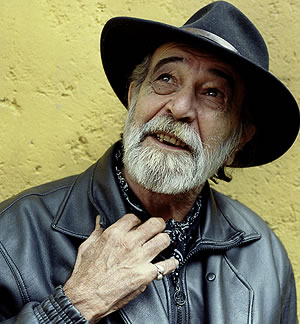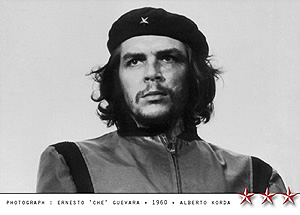|
|
A homage to a friend.
Alberto Korda came to Mexico City last year, on account of an exhibition that he had been given at the French Cultural Institute. I had not seen Alberto for a good number of years, so it was particularly gratifying to have him visit us at our home in Coyoacán, together with his son Fidel and Darrel Coutourier from Los Angeles, among some of the friends that came that day with him. We took some pictures of each other, and then went to have a nice lunch. We talked about mutual friends we had not seen over the years and about photography, especially about digital image making. We discussed doing an exhibition of his work here at ZoneZero, withimages that his son Fidel and Darrel would choose, with images that had not yet been seen elsewhere. Time moved on, Darrel and I met once to continue with the idea of the show, Fidel who lives in Sweden was hard to reach through email. Then I got an email from Fidel some months later, and the idea continued to be in the planning stage. Today it is with great sadness that I report the loss of Alberto Korda. However sad the loss of a friend always is, one thing that can be said is that Korda had a very full life. We will keep you in our memory as someone who enjoyed his life to the fullest. Pedro Meyer |
|
Alberto
Korda Dies at Age 72; Photographer Of Castro, Che
Alberto Korda, 72, the photographer whose picture of Ernesto "Che" Guevara became one of the best-known images of leftist and student revolts, died of a heart attack May 25 in Paris, where the Havana resident was attending an exhibition of his work. The image of Guevara wearing a military beret over flowing curls and gazing pensively took on icon status when it appeared soon after the revolutionary leader was captured and killed in Bolivia in 1967. The picture, called "Guerrillero Heroico," was on posters and T-shirts, key rings, caps and even socks. But Mr. Korda, a true believer in communism, received little monetary reward for his photograph. In the late 1990s, angered by the rampant commercialization of the image, he successfully sued a British ad agency that had used it in a campaign for vodka. Mr. Korda was born Alberto Diaz Gutierrez in Havana, the son of a railway worker. Mr. Korda, who became a prominent fashion photographer in Cuba, loved fast cars and beautiful women. He had a Porsche, an MG and a fine studio across the street from the luxurious National Hotel. But he also fell in love with the Cuban revolution and surrendered all the trappings of capitalism. From 1959 on, he abandoned commercial photography for photojournalism, spending much of his time as Fidel Castro's personal photographer. He captured images of Castro and Che playing golf and fishing; Castro with Soviet leader Nikita Khrushchev; Castro with American author Ernest Hemingway; and even an encounter Castro had with a caged tiger at a New York zoo. On March 4, 1960, Mr. Korda was working as a freelance photographer for the Cuban newspaper Revolucion covering a memorial service for 136 people killed in the explosion of a munitions ship in Havana harbor. Castro was delivering a scathing attack against the United States, which he blamed for the blast. Guevara, then a minister in the Cuban government, showed up briefly, and Mr. Korda captured his image in just two frames, one of them particularly good, in Mr. Korda's opinion. It was of little interest to the editors at Revolucion. Castro was the star that day, and his face would be on the front page. Mr. Korda kept his negatives. Seven years later, when Guevara, then operating in Bolivia, was captured by soldiers and killed, he instantly became a martyr to the revolution. Almost instantly, Mr. Korda's picture started showing up in Europe, which the Cuban government and Mr. Korda didn't seem to mind. Over the years, he made a good living by Cuban standards selling prints of his Che image. He donated the settlement money from the vodka ads suit to a children's hospital in Havana. © 2001 The Washington Post Company. |

